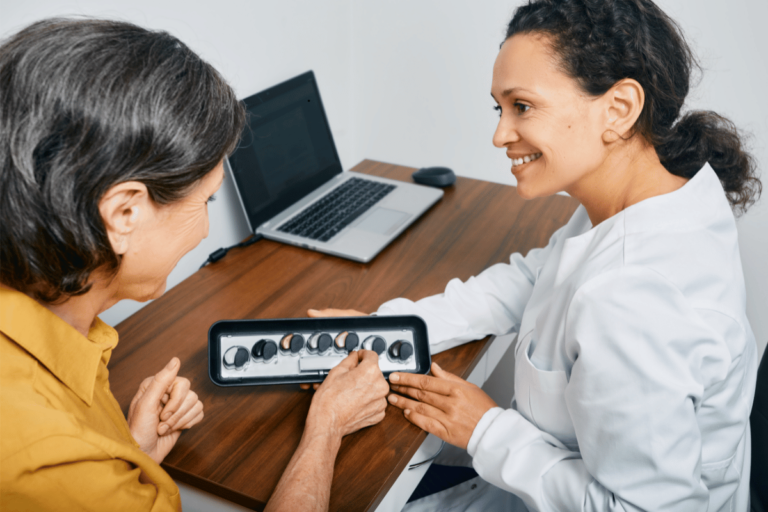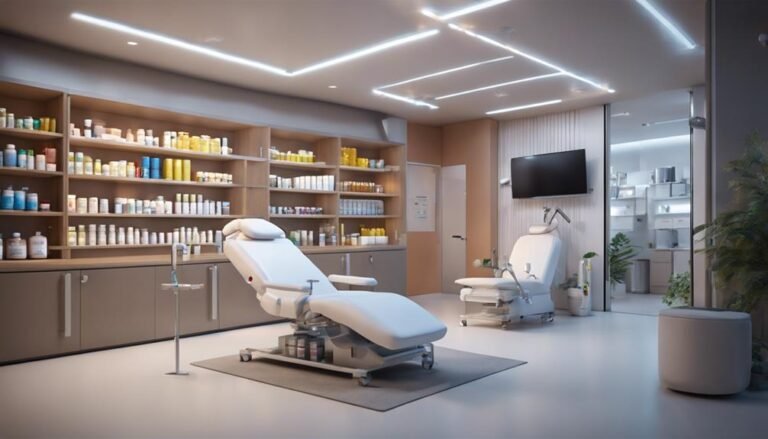Colonoscopy Screening: Detecting Disease Early for Peace of Mind
When it comes to your well-being, peace of mind is invaluable. Imagine having the ability to detect potential health issues early, allowing for timely intervention and better outcomes. Colonoscopy screening offers precisely that – a proactive approach to managing your health. By exploring the significance of early disease detection through this procedure, you'll gain a deeper understanding of its impact on your overall well-being. Stay tuned to uncover how colonoscopy screening can be a crucial tool in safeguarding your health for the future.
Key Takeaways
- Colonoscopy detects diseases early for timely intervention.
- Early detection provides peace of mind and anxiety relief.
- Removes precancerous polyps to prevent disease progression.
- Supports better health outcomes and improved survival rates.
- Ensures proactive health management and a healthier future.
Importance of Colonoscopy Screening
When considering preventive healthcare measures, colonoscopy screening stands out as an essential tool in detecting potential diseases early on. This procedure plays a vital role in health maintenance and disease prevention by allowing healthcare providers to identify and remove precancerous polyps before they develop into colorectal cancer. Beyond its significance in disease prevention, colonoscopy screening also provides anxiety relief for individuals who may be worried about their health status. Knowing that you have undergone a thorough examination can offer peace of mind and reassurance regarding your overall well-being.
During a colonoscopy, a flexible tube with a camera is inserted into the colon to visualize any abnormalities. This detailed examination allows for the early detection of conditions such as colorectal cancer, inflammatory bowel disease, and other digestive disorders. By undergoing regular colonoscopy screenings as part of your preventive measures, you're taking proactive steps towards maintaining your health and potentially avoiding serious illnesses.
Early Detection Saves Lives
When it comes to colonoscopy screenings, early detection can truly make a difference in saving lives. By identifying potential issues at an early stage, individuals have a higher chance of successful treatment and improved outcomes.
The impact of timely screenings on survival rates can't be overstated, emphasizing the vital role of early detection in preventing advanced diseases.
Importance of Screenings
Regular colonoscopy screenings play an essential role in the early detection of diseases, potentially saving lives through timely intervention. These screenings offer significant benefits by allowing healthcare providers to identify and remove precancerous polyps before they develop into cancer, serving as a preventive measure against colorectal cancer.
Detecting diseases in their early stages through colonoscopies can lead to better health outcomes, as treatment can be initiated promptly when the disease is most manageable. Additionally, screening can help in detecting other conditions such as inflammatory bowel disease and gastrointestinal bleeding, enabling early intervention and improved quality of life.
Impact on Survival
By undergoing regular colonoscopy screenings as recommended by healthcare professionals, you're actively enhancing your chances of early disease detection, greatly impacting survival rates by enabling timely intervention. Research consistently shows that early detection through colonoscopy screenings leads to improved survival rates among individuals at risk for colorectal cancer.
Statistics indicate that the five-year survival rate for individuals whose colorectal cancer is detected at an early stage is markedly higher compared to those diagnosed at a later, more advanced stage. This emphasizes the critical role that colonoscopy plays in detecting abnormalities in the colon and rectum before they progress into advanced stages of disease.
Regular screenings not only aid in the early detection of cancerous growths but also enable the removal of precancerous polyps, effectively halting disease progression. By staying proactive with colonoscopy screenings, you're empowering yourself with the knowledge and tools necessary to potentially increase your chances of survival in the face of colorectal cancer.
Understanding the Procedure
When preparing for a colonoscopy, you'll first receive an overview of the procedure, followed by detailed instructions on how to prepare your bowel.
During the colonoscopy, a thin, flexible tube with a camera is inserted into your rectum to examine your colon.
After the procedure, you can expect a recovery process that may include some bloating and gas but should generally be mild and short-lived.
Procedure Overview
Exploring the intricate details of a colonoscopy procedure can offer a comprehensive understanding of the process involved in disease detection. The patient experience during a colonoscopy is vital for ensuring comfort and ease. Before the procedure, you'll have the option to discuss sedation choices with your healthcare provider. Sedation options may include conscious sedation, where you're awake but relaxed, or deeper sedation where you may not remember the procedure. Once the sedation choice is made, the colonoscopy will begin.
During the procedure, a thin, flexible tube with a camera attached, called a colonoscope, is gently inserted into the rectum and guided through the colon. This allows the doctor to carefully examine the entire length of the colon for any abnormalities like polyps or signs of inflammation. If any polyps are discovered, they can be removed during the colonoscopy. The procedure typically takes about 30-60 minutes, depending on the findings and any necessary interventions. After the colonoscopy, you'll be monitored for a short period before being discharged home.
Preparation Steps
To prepare for a colonoscopy procedure, you'll need to follow specific steps outlined by your healthcare provider. Preparation is vital for a successful examination. Your doctor will provide you with detailed instructions, including dietary restrictions and prep tips to make sure your colon is thoroughly cleansed for the procedure.
Typically, you'll need to follow a clear liquid diet a day before the colonoscopy. This diet may include water, clear broths, plain gelatin, and popsicles. Avoid red or purple liquids as they can mimic bleeding during the procedure. Your healthcare provider may also recommend specific laxatives or solutions to help empty your colon completely. It's important to follow these instructions carefully to guarantee accurate results and a smooth procedure.
Remember to stay hydrated during the prep process and follow any additional guidelines provided by your doctor. Proper preparation plays a significant role in the effectiveness of the colonoscopy, allowing for a thorough examination and potential early detection of any abnormalities.
Recovery Process
The recovery process post-colonoscopy involves monitoring for any potential side effects and gradually resuming normal activities under the guidance of your healthcare provider.
After the procedure, you may experience some bloating or gas due to the air that was used to inflate your colon during the colonoscopy. This discomfort is usually temporary and should resolve within a few hours. It's essential to stay hydrated and avoid heavy meals immediately after the procedure to aid in your recovery.
Your healthcare provider will provide you with specific recovery tips tailored to your individual needs. They'll also discuss any findings from the colonoscopy and provide guidance on follow-up care if necessary. It's important to follow these instructions carefully to ensure proper healing and to address any potential concerns promptly.
Remember to rest and allow your body time to recover after the colonoscopy. If you experience severe abdominal pain, persistent bleeding, or any other concerning symptoms, contact your healthcare provider immediately for further evaluation and guidance.
Who Should Consider Screening
Consideration for colonoscopy screening should be given to individuals based on their age, family history, and risk factors for colorectal diseases. Screening eligibility is typically recommended for individuals aged 45 and above, with some guidelines suggesting starting at 50. However, if you have a family history of colorectal cancer or other conditions, screening might be advised earlier. Risk factors such as obesity, smoking, and inflammatory bowel diseases can also increase the likelihood of developing colorectal diseases, making screening more important.
In terms of age recommendations, it's generally agreed that regular screenings should commence around the age of 50, but recent trends show a shift towards starting at 45 due to an increase in colorectal cancer cases among younger individuals. Screening guidelines often emphasize the importance of early detection in preventing advanced-stage colorectal diseases. Therefore, if you fall within the recommended age group or have specific risk factors, discussing screening options with your healthcare provider is essential for timely intervention and peace of mind.
Benefits of Timely Intervention
Initiating timely intervention through regular colonoscopy screenings plays an essential role in detecting and preventing the progression of colorectal diseases. By undergoing timely colonoscopy screenings, you can actively engage in managing your health and potentially avoiding serious complications associated with colorectal conditions.
Here are three key benefits of timely intervention:
- Early Detection: Timely colonoscopy screenings can detect precancerous polyps or early-stage colorectal cancer when treatment is most effective. This early detection can greatly improve your chances of successful treatment outcomes and survival rates.
- Preventive Measures: Timely interventions allow healthcare providers to implement preventive measures promptly. This may include the removal of precancerous polyps during the colonoscopy procedure, reducing the risk of these polyps developing into cancer over time.
- Peace of Mind: Regular colonoscopy screenings provide peace of mind by ensuring that any potential issues are identified early, enabling timely treatment and management, thus reducing anxiety related to undiagnosed health concerns.
Peace of Mind Through Prevention
When it comes to your health, preventive care is essential for maintaining overall well-being.
By prioritizing regular screenings like colonoscopies, you can catch potential issues early on, increasing treatment success rates.
Preventive Care Importance
To ensure excellent health outcomes, prioritizing preventive care is crucial for achieving peace of mind through prevention. By integrating preventive measures and healthy lifestyle habits into your daily routine, you can greatly diminish the risk of developing serious health conditions.
- Regular Exercise: Engaging in physical activity not only helps maintain a healthy weight but also enhances your immune system, reducing the likelihood of illnesses.
- Balanced Diet: Consuming a variety of nutritious foods rich in vitamins, minerals, and antioxidants can fortify your body's defenses and support overall well-being.
- Annual Check-ups: Scheduling routine check-ups and health monitoring appointments with your healthcare provider allows for early detection of any potential health issues, enabling prompt intervention and treatment.
Early Detection Benefits
By incorporating regular screenings such as colonoscopy into your healthcare regimen, you can proactively detect potential health issues early, providing peace of mind through prevention. Identifying risk factors that may predispose you to certain conditions is essential. Understanding your family history can also play a significant role in raising awareness about diseases that may run in your family. Early detection through screenings allows healthcare providers to intervene promptly, potentially preventing the progression of diseases. Prevention is key in maintaining excellent health and well-being.
Screening Frequency and Guidelines
Regular screening intervals and adherence to established guidelines are crucial for effective disease detection through colonoscopy. To guarantee you're following the most current recommendations, consider the following:
- Screening Intervals: The frequency of colonoscopy screenings can vary based on individual risk factors and findings from previous screenings. Updated guidelines recommend that individuals with average risk should undergo a colonoscopy every 10 years starting at age 50. However, if polyps are found, more frequent screenings may be necessary.
- Age Recommendations: While the general age to begin colonoscopy screenings is 50, individuals with certain risk factors such as a family history of colorectal cancer may need to start screening earlier. Your healthcare provider can help determine the most appropriate age to begin screenings based on your personal and family medical history.
- Risk Factors: Factors such as a personal history of colorectal cancer, inflammatory bowel disease, or a family history of colorectal cancer can increase your risk. It's important to discuss these risk factors with your doctor to establish a personalized screening plan that best suits your needs.
Minimizing Risks, Maximizing Benefits
Minimizing risks and maximizing benefits during colonoscopy screenings requires meticulous attention to procedural protocols and patient well-being. Understanding the risk factors associated with the procedure is essential in ensuring favorable outcomes. Common complications of colonoscopy include bleeding, perforation, and adverse reactions to sedation. These risks can be minimized by thorough patient assessment, proper sedation management, and skilled endoscopists.
Patient satisfaction is also a vital aspect of the screening process. Clear communication about the procedure, managing expectations, and providing adequate post-procedure care contribute to positive results. Additionally, focusing on patient comfort, dignity, and privacy enhances the overall experience.
Monitoring patient outcomes post-colonoscopy is crucial for evaluating the effectiveness of the screening and identifying areas for improvement. By prioritizing safety, communication, and patient-centered care, healthcare providers can ensure that colonoscopy screenings aren't only effective in detecting diseases early but also provide peace of mind for individuals undergoing the procedure.
How to Prepare for a Colonoscopy
To guarantee a successful colonoscopy procedure, thorough preparation is essential. Here are three key steps to help you prepare effectively:
- Prep Techniques: Your healthcare provider will provide you with specific instructions on how to prepare your bowel for the colonoscopy. This typically involves a clear liquid diet the day before the procedure and a bowel preparation solution to help empty your colon. It's important to follow these instructions carefully to achieve clear visualization during the colonoscopy.
- Dietary Restrictions: Before the colonoscopy, you may need to avoid certain foods that are harder to digest or can leave residue in the colon. Common restrictions include avoiding seeds, nuts, raw fruits and vegetables, and whole grains. It's important to stick to the recommended diet plan to help achieve best results during the procedure.
- Stay Hydrated: While following the dietary restrictions, remember to stay well-hydrated by drinking clear liquids such as water, broth, and sports drinks. Proper hydration is essential for the success of the colonoscopy and helps support your overall well-being throughout the preparation process.
The Role of Colonoscopy in Health Maintenance
Ensuring optimal health maintenance, colonoscopy plays a crucial role in detecting and preventing colorectal diseases. Colonoscopy is a key component of preventative care, allowing healthcare providers to visually examine the lining of your colon for any abnormalities such as polyps or early signs of cancer. Through this procedure, potential issues can be identified and addressed early, leading to better health outcomes.
Regular colonoscopies are recommended for individuals over 50, or earlier if there's a family history of colorectal cancer or other risk factors. The frequency of screenings may vary based on your individual health profile and any findings from previous exams. By staying up to date with colonoscopy screenings as part of your health maintenance routine, you can significantly reduce your risk of developing serious colorectal conditions.
In addition to detecting abnormalities, colonoscopies can also be used to remove precancerous polyps during the procedure, further reducing the likelihood of developing colorectal cancer. Embracing colonoscopies as a proactive measure in your health maintenance plan can provide peace of mind and contribute to a healthier future.
Conclusion
Now that you understand the importance of colonoscopy screening in detecting diseases early and potentially saving lives, it's vital to take action.
By staying proactive and getting regular screenings, you can have peace of mind knowing that you're actively managing your health.
Don't wait for symptoms to appear – stay ahead of any potential issues and prioritize your well-being.
Your health is worth the effort, so schedule your screening today and stay on top of your health journey.







